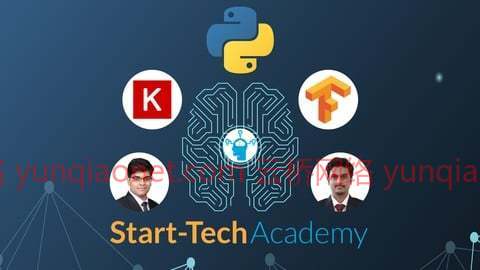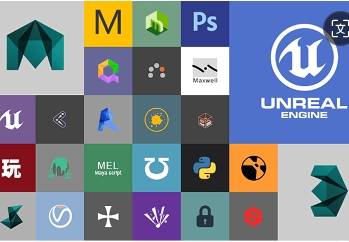
用Python学习人工神经网络。使用Keras & Tensorflow| Python构建预测性深度学习模型
你会学到:
深入了解人工神经网络和深度学习
了解人工神经网络适用的业务场景
用Python构建人工神经网络
使用人工神经网络进行预测
了解Keras和Tensorflow库的用法
使用熊猫数据帧来处理数据和进行统计计算。
时长:9h 15m |视频:. MP4,1280×720 30 fps |音频:AAC,44.1 kHz,2ch |大小解压后:3.17 GB
语言:英语+中英文字幕(云桥网络 机译)


要求:
学生将需要安装Python和Anaconda软件,但我们有一个单独的讲座来帮助您安装sameS
描述:
你正在寻找一个完整的人工神经网络(ANN)课程,它会教你用Python创建神经网络模型所需的一切,对吗?
你找到了正确的神经网络课程!
完成本课程后,您将能够:
确定可以使用神经网络模型解决的业务问题。
清楚了解高级神经网络概念,如梯度下降、前向和后向传播等。
使用Keras和Tensorflow库在Python中创建神经网络模型,并分析其结果。
自信地练习、讨论和理解深度学习概念

这门课对你有什么帮助?
一份可验证的结业证书将提交给所有学习神经网络课程的学生。
如果你是一名业务分析师或高管,或者是一名想在现实世界的业务问题中学习和应用深度学习的学生,本课程将通过教你一些最先进的神经网络概念及其在Python中的实现,而不会变得过于数学化,从而为你提供坚实的基础。
为什么要选择这门课?
本课程涵盖了使用神经网络创建预测模型应采取的所有步骤。
大多数课程只侧重于教授如何进行分析,但我们相信,对概念有很强的理论理解使我们能够创建一个好的模型。在运行分析之后,人们应该能够判断模型有多好,并将结果解释为实际上能够帮助业务。

我们凭什么有资格教你?
该课程由Abhishek和Pukhraj教授。作为全球分析咨询公司的经理,我们已经使用深度学习技术帮助企业解决了他们的业务问题,并且我们已经利用我们的经验将数据分析的实际方面包括在本课程中
我们也是一些最受欢迎的在线课程的创作者,有超过25万的注册人数和数以千计的5星级评价,例如:
这很好,我喜欢所有给出的解释都能被一个外行人理解的事实——约书亚
谢谢作者的精彩课程。你是最棒的,这门课值得任何代价。黛西
我们的承诺
教育我们的学生是我们的工作,我们致力于此。如果您对课程内容、练习单或任何相关主题有任何疑问,您可以随时在课程中发布问题或直接向我们发送消息。
下载练习文件,参加练习测试,并完成作业
每堂课都附有课堂笔记,供你跟随。你也可以参加实践测试来检查你对概念的理解。有一个最后的实践作业给你,让你去实践你的学习。
本课程涵盖哪些内容?
本课程教您创建基于神经网络的模型(即深度学习模型)以解决业务问题的所有步骤。

以下是本课程关于人工神经网络的课程内容:
第1部分- Python基础
这一部分让您开始使用Python。
这一部分将帮助您在系统上设置python和Jupyter环境,并教您如何用Python执行一些基本操作。我们将了解不同图书馆的重要性,如Numpy、Pandas & Seaborn。
第2部分-理论概念
这一部分将使你对神经网络中涉及的概念有一个坚实的理解。
在本节中,您将了解单个单元或感知器,以及感知器如何堆叠以创建网络架构。一旦设置了架构,我们就可以理解梯度下降算法来寻找函数的最小值,并了解如何使用它来优化我们的网络模型。
第3部分-用Python创建回归和分类人工神经网络模型
在这一部分中,您将学习如何在Python中创建人工神经网络模型。
我们将从使用顺序应用编程接口创建人工神经网络模型来解决分类问题开始这一部分。我们学习如何定义网络架构、配置模型和训练模型。然后我们评估我们训练的模型的性能,并使用它来预测新数据。我们还解决了一个回归问题,在这个问题中,我们试图预测一个地点的房价。我们还将介绍如何使用功能性应用编程接口创建复杂的人工神经网络体系结构。最后,我们学习如何保存和恢复模型。
在这一部分中,我们也理解像Keras和TensorFlow这样的库的重要性。
第4部分-数据预处理
在这一部分中,您将了解需要采取什么措施来准备数据进行分析,这些步骤对于创建有意义的。
在本节中,我们将从决策树的基本理论开始,然后讨论数据预处理主题,如缺失值插补、变量转换和Test-Train分割。
第5部分-经典ML技术-线性回归本节从简单的线性回归开始,然后介绍多元线性回归。
我们已经涵盖了每个概念背后的基本理论,但没有太多的数学知识
理解这个概念来自哪里,以及它有多重要。但是即使你不明白
只要你学会如何运行和解释在实践课中教授的结果,一切都会好的。
我们还研究如何量化模型的准确性,F统计的意义是什么,自变量数据集中的分类变量在结果中是如何解释的,以及我们最终如何解释结果来找出业务问题的答案。
到本课程结束时,您用Python创建神经网络模型的信心将会飙升。您将彻底了解如何使用人工神经网络来创建预测模型和解决业务问题。

以下是一些想要开始深度学习之旅的学生的常见问题解答-
为什么要使用Python进行深度学习?
理解Python是深度学习职业生涯所需的宝贵技能之一。
尽管并非一直如此,但Python是数据科学的首选编程语言。这里有一段简短的历史:
2016年,它在数据科学竞赛的首要平台Kaggle上超越了R。
2017年,在kd掘金对数据科学家最常用工具的年度调查中,它超过了R。
2018年,66%的数据科学家报告每天使用Python,使其成为分析专业人士的头号工具。
深度学习专家预计,随着Python生态系统的不断发展,这一趋势将继续下去。虽然您学习Python编程的旅程可能才刚刚开始,但很高兴知道就业机会也很丰富(并且还在增长)。
数据挖掘、机器学习和深度学习有什么区别?
简而言之,机器学习和数据挖掘使用与数据挖掘相同的算法和技术,只是预测的种类不同。当数据挖掘发现以前未知的模式和知识时,机器学习再现已知的模式和知识,并进一步自动将这些信息应用于数据、决策和行动。
另一方面,深度学习使用先进的计算能力和特殊类型的神经网络,并将它们应用于大量数据,以学习、理解和识别复杂的模式。自动语言翻译和医学诊断是深度学习的例子。
这门课是给谁上的:
追求数据科学职业的人
职业人士开始他们的神经网络之旅
需要更多实践经验的统计学家
有人想在短时间内从初级水平掌握人工神经网络吗
Duration: 9h 15m | Video: .MP4, 1280×720 30 fps | Audio: AAC, 44.1 kHz, 2ch | Size: 3.03 GB
Genre: eLearning | Language: English
Learn Artificial Neural Networks (ANN) in Python. Build predictive deep learning models using Keras & Tensorflow| Python
What you’ll learn:
Get a solid understanding of Artificial Neural Networks (ANN) and Deep Learning
Understand the business scenarios where Artificial Neural Networks (ANN) is applicable
Building a Artificial Neural Networks (ANN) in Python
Use Artificial Neural Networks (ANN) to make predictions
Learn usage of Keras and Tensorflow libraries
Use Pandas DataFrames to manipulate data and make statistical computations.
Requirements:
Students will need to install Python and Anaconda software but we have a separate lecture to help you install the sameS
Description:
You’re looking for a complete Artificial Neural Network (ANN) course that teaches you everything you need to create a Neural Network model in Python, right?
You’ve found the right Neural Networks course!
After completing this course you will be able to:
Identify the business problem which can be solved using Neural network Models.
Have a clear understanding of Advanced Neural network concepts such as Gradient Descent, forward and Backward Propagation etc.
Create Neural network models in Python using Keras and Tensorflow libraries and analyze their results.
Confidently practice, discuss and understand Deep Learning concepts
How this course will help you?
A Verifiable Certificate of Completion is presented to all students who undertake this Neural networks course.
If you are a business Analyst or an executive, or a student who wants to learn and apply Deep learning in Real world problems of business, this course will give you a solid base for that by teaching you some of the most advanced concepts of Neural networks and their implementation in Python without getting too Mathematical.
Why should you choose this course?
This course covers all the steps that one should take to create a predictive model using Neural Networks.
Most courses only focus on teaching how to run the analysis but we believe that having a strong theoretical understanding of the concepts enables us to create a good model . And after running the analysis, one should be able to judge how good the model is and interpret the results to actually be able to help the business.
What makes us qualified to teach you?
The course is taught by Abhishek and Pukhraj. As managers in Global Analytics Consulting firm, we have helped businesses solve their business problem using Deep learning techniques and we have used our experience to include the practical aspects of data analysis in this course
We are also the creators of some of the most popular online courses – with over 250,000 enrollments and thousands of 5-star reviews like these ones:
This is very good, i love the fact the all explanation given can be understood by a layman – Joshua
Thank you Author for this wonderful course. You are the best and this course is worth any price. – Daisy
Our Promise
Teaching our students is our job and we are committed to it. If you have any questions about the course content, practice sheet or anything related to any topic, you can always post a question in the course or send us a direct message.
Download Practice files, take Practice test, and complete Assignments
With each lecture, there are class notes attached for you to follow along. You can also take practice test to check your understanding of concepts. There is a final practical assignment for you to practically implement your learning.
What is covered in this course?
This course teaches you all the steps of creating a Neural network based model i.e. a Deep Learning model, to solve business problems.
Below are the course contents of this course on ANN:
Part 1 – Python basics
This part gets you started with Python.
This part will help you set up the python and Jupyter environment on your system and it’ll teach you how to perform some basic operations in Python. We will understand the importance of different libraries such as Numpy, Pandas & Seaborn.
Part 2 – Theoretical Concepts
This part will give you a solid understanding of concepts involved in Neural Networks.
In this section you will learn about the single cells or Perceptrons and how Perceptrons are stacked to create a network architecture. Once architecture is set, we understand the Gradient descent algorithm to find the minima of a function and learn how this is used to optimize our network model.
Part 3 – Creating Regression and Classification ANN model in Python
In this part you will learn how to create ANN models in Python.
We will start this section by creating an ANN model using Sequential API to solve a classification problem. We learn how to define network architecture, configure the model and train the model. Then we evaluate the performance of our trained model and use it to predict on new data. We also solve a regression problem in which we try to predict house prices in a location. We will also cover how to create complex ANN architectures using functional API. Lastly we learn how to save and restore models.
We also understand the importance of libraries such as Keras and TensorFlow in this part.
Part 4 – Data Preprocessing
In this part you will learn what actions you need to take to prepare Data for the analysis, these steps are very important for creating a meaningful.
In this section, we will start with the basic theory of decision tree then we cover data pre-processing topics like missing value imputation, variable transformation and Test-Train split.
Part 5 – Classic ML technique – Linear RegressionThis section starts with simple linear regression and then covers multiple linear regression.
We have covered the basic theory behind each concept without getting too mathematical about it so that you
understand where the concept is coming from and how it is important. But even if you don’t understand
it, it will be okay as long as you learn how to run and interpret the result as taught in the practical lectures.
We also look at how to quantify models accuracy, what is the meaning of F statistic, how categorical variables in the independent variables dataset are interpreted in the results and how do we finally interpret the result to find out the answer to a business problem.
By the end of this course, your confidence in creating a Neural Network model in Python will soar. You’ll have a thorough understanding of how to use ANN to create predictive models and solve business problems.
Go ahead and click the enroll button, and I’ll see you in lesson 1!
Cheers
Start-Tech Academy
————
Below are some popular FAQs of students who want to start their Deep learning journey-
Why use Python for Deep Learning?
Understanding Python is one of the valuable skills needed for a career in Deep Learning.
Though it hasn’t always been, Python is the programming language of choice for data science. Here’s a brief history:
In 2016, it overtook R on Kaggle, the premier platform for data science competitions.
In 2017, it overtook R on KDNuggets’s annual poll of data scientists’ most used tools.
In 2018, 66% of data scientists reported using Python daily, making it the number one tool for analytics professionals.
Deep Learning experts expect this trend to continue with increasing development in the Python ecosystem. And while your journey to learn Python programming may be just beginning, it’s nice to know that employment opportunities are abundant (and growing) as well.
What is the difference between Data Mining, Machine Learning, and Deep Learning?
Put simply, machine learning and data mining use the same algorithms and techniques as data mining, except the kinds of predictions vary. While data mining discovers previously unknown patterns and knowledge, machine learning reproduces known patterns and knowledge—and further automatically applies that information to data, decision-making, and actions.
Deep learning, on the other hand, uses advanced computing power and special types of neural networks and applies them to large amounts of data to learn, understand, and identify complicated patterns. Automatic language translation and medical diagnoses are examples of deep learning.
Who this course is for:
People pursuing a career in data science
Working Professionals beginning their Neural Network journey
Statisticians needing more practical experience
Anyone curious to master ANN from Beginner level in short span of time
云桥网络 为三维动画制作,游戏开发员、影视特效师等CG艺术家提供视频教程素材资源!
1、登录后,打赏30元成为VIP会员,全站资源免费获取!
2、资源默认为百度网盘链接,请用浏览器打开输入提取码不要有多余空格,如无法获取 请联系微信 yunqiaonet 补发。
3、分卷压缩包资源 需全部下载后解压第一个压缩包即可,下载过程不要强制中断 建议用winrar解压或360解压缩软件解压!
4、云桥网络平台所发布资源仅供用户自学自用,用户需以学习为目的,按需下载,严禁批量采集搬运共享资源等行为,望知悉!!!
5、云桥网络-CG数字艺术学习与资源分享平台,感谢您的赞赏与支持!平台所收取打赏费用仅作为平台服务器租赁及人员维护资金 费用不为素材本身费用,望理解知悉!


